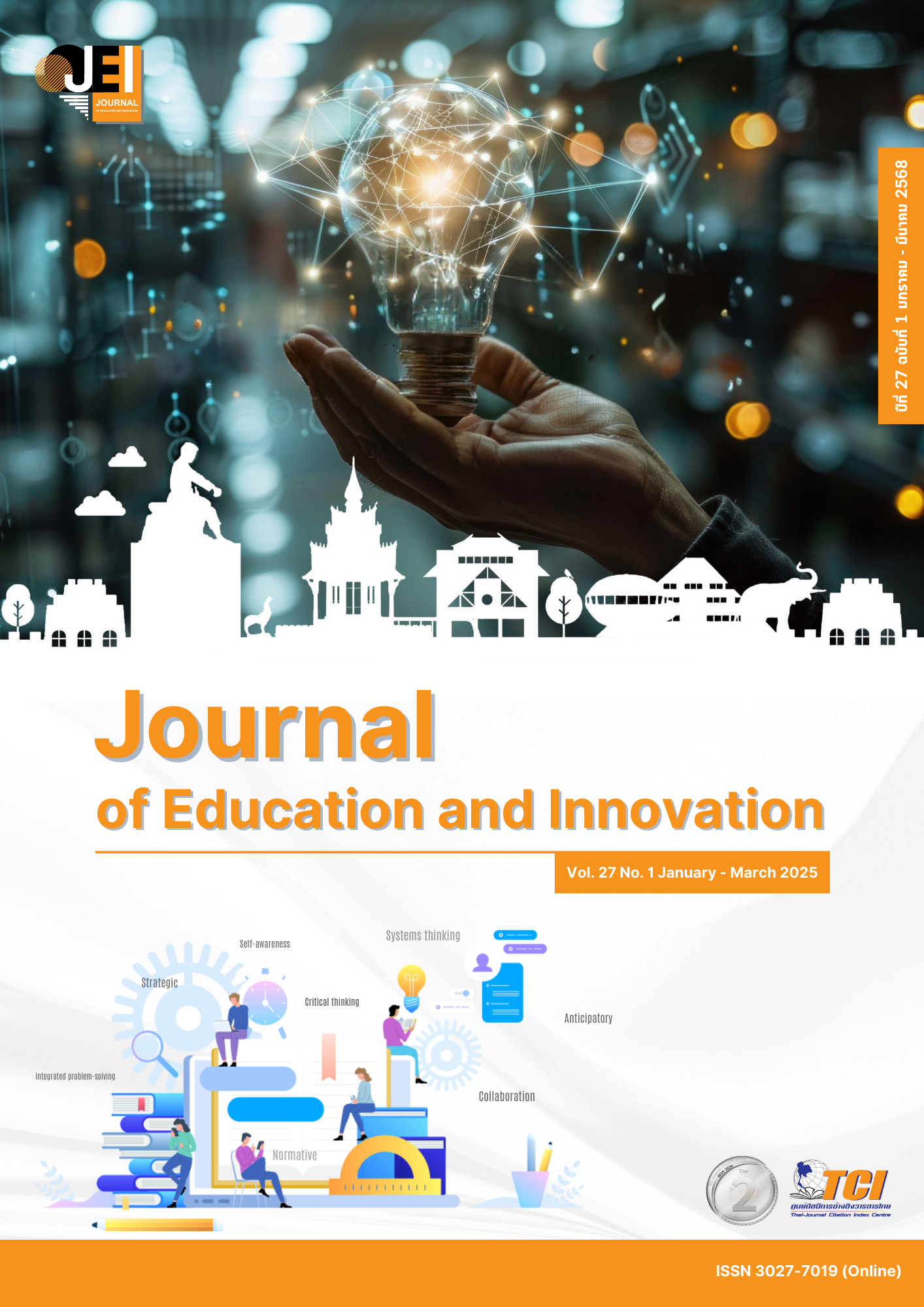การพัฒนาการจัดการเรียนรู้แบบสร้างสรรค์เป็นฐานร่วมกับเทคนิคการเรียนรู้แบบร่วมมือ ที่ส่งเสริมความสามารถในการออกแบบหลักสูตรรายวิชาเพิ่มเติมของนักศึกษาวิชาชีพครู
Main Article Content
บทคัดย่อ
การวิจัยครั้งนี้มีวัตถุประสงค์ เพื่อ 1) พัฒนาแผนการจัดการเรียนรู้แบบสร้างสรรค์เป็นฐานร่วมกับเทคนิคการเรียนรู้แบบร่วมมือให้มีประสิทธิภาพตามเกณฑ์ 75/75 2) เปรียบเทียบความรู้ความเข้าใจในการออกแบบหลักสูตรรายวิชาเพิ่มเติมของนักศึกษาวิชาชีพครูก่อนและหลังได้รับการจัดการเรียนรู้แบบสร้างสรรค์เป็นฐานร่วมกับเทคนิคการเรียนรู้แบบร่วมมือ 3) เปรียบเทียบความสามารถในการออกแบบหลักสูตรรายวิชาเพิ่มเติมของนักศึกษาวิชาชีพครูหลังได้รับการจัดการเรียนรู้แบบสร้างสรรค์เป็นฐานร่วมกับเทคนิคการเรียนรู้แบบร่วมมือกับเกณฑ์ร้อยละ 70 ของคะแนนเต็ม และ 4) ศึกษาความคิดเห็นของนักศึกษาวิชาชีพครูที่มีต่อการจัดการเรียนรู้แบบสร้างสรรค์เป็นฐานร่วมกับเทคนิคการเรียนรู้แบบร่วมมือ ตัวอย่างวิจัยในครั้งนี้ ได้แก่ นักศึกษาวิชาชีพครูชั้นปีที่ 1 สาขาวิชาคณิตศาสตร์ คณะครุศาสตร์ มหาวิทยาลัยราชภัฏเพชรบูรณ์ ปีการศึกษา 2566 จำนวน 30 คน ซึ่งได้มาโดยการสุ่มตัวอย่างแบบกลุ่ม เครื่องมือที่ใช้ในการวิจัย ประกอบด้วย แผนการจัดการเรียนรู้ แบบทดสอบวัดความรู้ความเข้าใจในการออกแบบหลักสูตรรายวิชาเพิ่มเติม แบบวัดความสามารถในการออกแบบหลักสูตรรายวิชาเพิ่มเติม และแบบสอบถามความคิดเห็นที่มีต่อการจัดการเรียนรู้แบบสร้างสรรค์เป็นฐานร่วมกับเทคนิคการเรียนรู้แบบร่วมมือ สถิติที่ใช้ในการวิเคราะห์ข้อมูล ได้แก่ ค่าเฉลี่ย ส่วนเบี่ยงเบนมาตรฐาน Dependent samples t-test และ One sample t-test ผลการวิจัย พบว่า 1) แผนการจัดการเรียนรู้แบบสร้างสรรค์เป็นฐานร่วมกับเทคนิคการเรียนรู้แบบร่วมมือมีประสิทธิภาพเท่ากับ 79.03/81.11 ซึ่งเป็นไปตามเกณฑ์ที่กำหนด 2) นักศึกษาวิชาชีพครูที่ได้รับการจัดการเรียนรู้แบบสร้างสรรค์เป็นฐานร่วมกับเทคนิคการเรียนรู้แบบร่วมมือมีความรู้ความเข้าใจในการออกแบบหลักสูตรรายวิชาเพิ่มเติมหลังเรียนสูงกว่าก่อนเรียน อย่างมีนัยสำคัญทางสถิติที่ระดับ .05 3) นักศึกษาวิชาชีพครูที่ได้รับการจัดการเรียนรู้แบบสร้างสรรค์เป็นฐานร่วมกับเทคนิคการเรียนรู้แบบร่วมมือมีความสามารถในการออกแบบหลักสูตรรายวิชาเพิ่มเติมหลังเรียนสูงกว่าเกณฑ์ร้อยละ 70 ของคะแนนเต็ม อย่างมีนัยสำคัญทางสถิติที่ระดับ .05 และ 4) ความคิดเห็นของนักศึกษาวิชาชีพครูที่มีต่อการจัดการเรียนรู้แบบสร้างสรรค์เป็นฐานร่วมกับเทคนิคการเรียนรู้แบบร่วมมือในด้านปัจจัยนำเข้า ด้านการจัดกิจกรรมการเรียนการสอน และด้านประโยชน์ที่ได้รับ โดยรวมอยู่ในระดับมากที่สุด
Article Details

อนุญาตภายใต้เงื่อนไข Creative Commons Attribution-NonCommercial-NoDerivatives 4.0 International License.
เจ้าของบทความมิได้คัดลอก หรือละเมิดลิขสิทธิ์ของผู้ใด หากเกิดการละเมิดลิขสิทธิ์ ไม่ว่าวิธีใด หรือการฟ้องร้องไม่ว่ากรณีใด ๆ ที่อาจเกิดขึ้นได้ กองบรรณาธิการวารสารศึกษาศาสตร์ ไม่มีส่วนเกี่ยวข้องทั้งสิ้น ให้เป็นสิทธิ์ของเจ้าของบทความที่จะดำเนินการ
เอกสารอ้างอิง
Atikhomkulchai, S. (2011). The development of selective courses on science project in local product for sixth grade students. Veridian E-Journal SU, 5(1), 412-437.
Boonkong, P., & Prasertcharoensuk, T. (2010). The problems of school curriculum management in private school, Muang district, Khon Kaen province. Journal of Education Graduate Studies Research Khon Kaen University, 4(4), 116-122.
Chookhampaeng, C. (2010). Curriculum and instruction research (2th ed.). Maha Sarakham: Mahasarakham University Press.
Dechakupt, P., & Yindeesuk, P. (2022). 5C Skills to develop learning units and operations (6th ed.). Bangkok: Academic Quality Development Institute.
Department of Academic Affairs, Ministry of Education. (2008). Basic Education Core Curriculum 2008. Bangkok: Agricultural Cooperatives Association of Thailand Printing.
Faculty of Education, Phetchabun Rajabhat University. (2023). Bachelor of Education in Mathematics (4-year Program) (Revised Curriculum 2023). Phetchabun: Phetchabun Rajabhat University.
Jetsadawiroj, S. (2021). Creativity-based learning management and multiple intelligence activities. Journal of Roi Kaensarn Academi, 6(11), 370-384.
Jetsadawiroj, S. (2017). Learning process of creativity-based learning (CBL) in the CEE2205 (creativity for children) course. Journal of Kasetsart Educational Review, 32(2), 1-8.
Kagan, S. (1994). Cooperative learning. San Clemente, California: Kagan Publishing.
Kaemkate, W. (2012). Research methodology in behavioral sciences (4th ed.). Bangkok: Chulalongkorn University Printing House.
Ornstein, A. C., & Hunkins, F. (2014). Curriculum foundations, Principles, and Issues (6th ed.). Harlow: Pearson.
Office of the Basic Education Commission. (2010). Examine the teacher section (Revised edition). Bangkok: Office of teacher development and additional basic education.
Office of Academic Affairs and Educational Standards. (2018). Course management guidelines according to the Basic Education Core Curriculum 2008. Bangkok: Agricultural Cooperatives Association of Thailand Printing.
Pinyo, W. (2011). The development of additional course curriculum on the topic of Nongchok studies for mathayomSuksa I students at Nongchokwittaya school in Phetchaburi province (Master thesis). Bangkok: Sukhothai Thammathirat Open University.
Pinthongpunth, K. (2021). Instruction management using Creativity-based learning model to prepare students for teaching practice: A case study of Social Studies Students, Faculty of Education, Songkhla Rajabhat University. Rajabhat Rambhai Barni Research Journal, 15(2), 173-182.
Prabpai, W. (2023). Effect of cooperative learning using learning together technique with technology media in teaching mathematics on percentage and ratio on mathematical problem-solving ability and mathematics learning achievement of prathomsuksa 6 students (Master thesis). Maha Sarakham: Mahasarakham University.
Ruachaiphanich, W. (2015). Creativity-based learning (CBL). Walailak Journal of Learning Innovations, 1(2), 23-37.
Sutthirat, C. (2021). Development curriculum: from theory to practice (8th ed.). Nonthaburi: MD All graphic.
Taba, H. (1962). Curriculum development: Theory and practice. New York: Harcourt, Brace & world.
Tiensawad, S. (2019). Instrument development for nursing research. Bangkok: Siampimnana.
Udomsuk, O. (2022). The learning achievement by using Creativity-based learning (CBL) with Infographic media in Thai literature learning management of mattayomsuksa 1 students. Phiku Journal, 20(1), 289-307.
Wongyai, W., & Patphol, M. (2024). Creative learning (4th ed.). Bangkok: Charansanitwong Printing.


